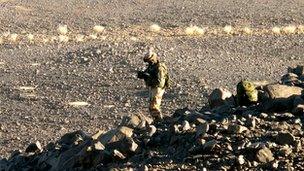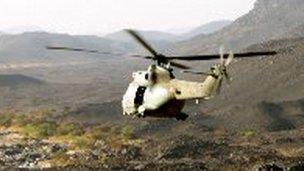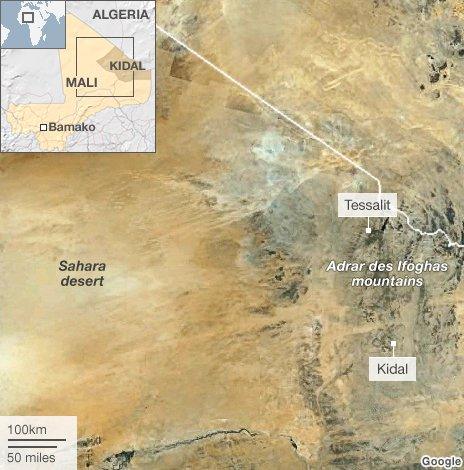French fight in Mali's hostile desert
- Published
French troops tracking Islamist rebels in Mali desert
They call it "planet Mars." French soldiers have been marching in the Tegharghar mountains of northern Mali for weeks.
The valley of Terz has been bombarded by French Mirage planes over the last month; the hunt is now conducted on foot.
But the sound of jets is constantly echoing over our head and through the valley.
Nearly 2,000 French soldiers are deployed all over the rocky desert, with as many troops from Chad in support.
They are searching for jihadist fighters and their hide-outs in the mountains - part of the Adrar des Ifoghas near the Algerian border.
The terrain is treacherous and unforgiving. The foreign legionnaires who we were embedded with looked exhausted; their noses and lips were sunburnt, they were caked in dust and hadn't showered in days.
Each soldier carries more than 50kg (8 stone) and under their boots, the rocks are as jagged and as sharp as glass.
It is relentless; it is unremitting. There is no respite here, and at 60C, the dark stones become as hot as burning coals.
Cave caches
The French have been advancing through the western entrance of the mountain range while the Chadians entered the eastern point.
Both the French and the Chadians engaged in the fiercest fighting last month, inflicting heavy casualties on the insurgents, including one of the most violent al-Qaeda field commanders, Abou Zeid.

French forces have been trying to uproot al-Qaeda from what they say was its "sanctuary"
The Chadians then formed a buffer force leaving time for the French to search valley after valley, hill after hill.
"We first used heavy artillery, jets and helicopters to downsize the enemy from a reasonable distance," Col Benoit Desmeulles, Commanding Officer at the Foreign Legion, said.
"We then started to clear all the caves in the valleys, which was down to man-to-man fighting.
"We clear caves with grenades before entering them."
Caches are being found every day, full of weapons, ammunition and food supplies.
After climbing yet another rocky crest, the unit we were following found explosive belts ready for use, mortars and 100kg of nitrate for the manufacture of improvised explosive devices (IEDs).
De-mining engineers immediately destroyed it all in a controlled explosion.
Melting away
In the valley of Ametetai, where the French believe al-Qaeda in the Islamic Maghreb had built its Malian "sanctuary", soldiers uncovered construction trucks that jihadi fighters used to dig trenches and underground caches.

French helicopters have been exposed to small arms fire in the region
They also found passports and medical supplies.
"We broke al-Qaeda's neck," said Gen Bernard Barrera who commands the French intervention from the nearby town of Tessalit.
"Most of their positions were located around the rare wells so they could be self-sufficient," he said.
The militants had cultivated their own vegetable gardens, stocked bags of rice and drums of oil.
Gen Barrera explained that soldiers had now searched nearly all corners of this area.
But how can one secure such a vast region, such a hostile desert where al-Qaeda and their allies have been operating for years?
The French want to cordon off this mountain range leaving no escape.
But the jihadis are determined; they know this rugged terrain better than anyone and although there is little doubt they have been severely hit, it is also no wonder that some of them are still there, hiding or trying to flee.
"We even found razors with freshly cut hair," Gen Barrera said.
"This shows that they want to shave their beards and melt into the population."
Fresh risks
There is very little human presence over hundreds of square kilometres. Camels and tiny nomad settlements can be seen from the attack helicopter we boarded.
"One night we had a visual for two motorcycles but it was extremely difficult to tell whether the two men riding them were jihadis or civilians," Tiger helicopter pilot Lt Cedric explained.
"We didn't engage them."
French helicopters fly low to surprise the gunmen they have spotted and avoid ground-to-air missiles.
However, the risk is huge: at 10 metres above the ground, they are vulnerable to lighter firearms. A pilot was killed on the first day of this military campaign when he came under fire from AK47s.
This is a war that must be fought rock after rock and France insists African forces must now take over.
To the French on the frontline, it feels like a lonely fight.
France also worries about the plight of seven of its nationals who are believed to be held hostage somewhere here; the search for them continues.
"The hostages are our main concern," Gen Barrera confessed.
But this is the concern of French special forces and we won't be told anything else.
French commanders are convinced that they have cut off the militants' routes of supply and trafficking.
But "this is their backyard", Cpl Philippe, a paratrooper from the Foreign Legion told me.
"We're only here to liberate Mali.
"There are a million ways to get in and there are million ways to get back," he warned.
